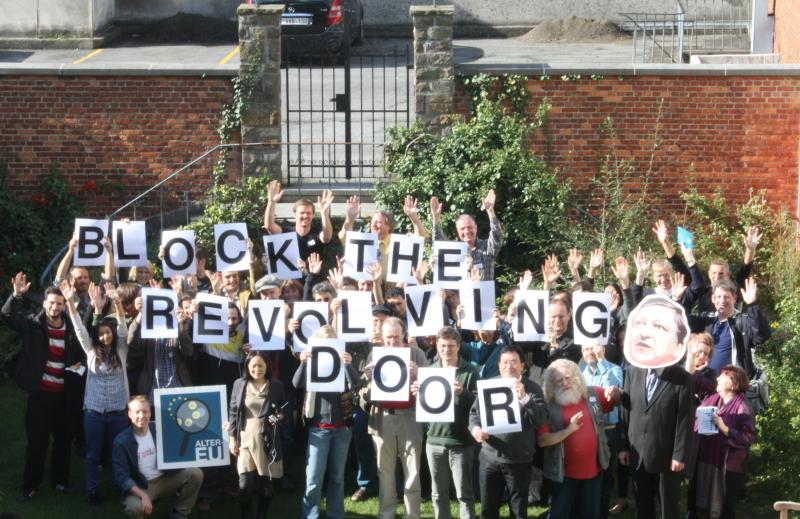
“Stop 2014 being year of revolving door!” say transparency campaigners
The Alliance for Lobbying Transparency and Ethics Regulation (ALTER-EU) [1] (of which Corporate Europe Observatory is a member) has today urged President Barroso to put in place new rules to prevent the current crop of European commissioners from going through the revolving door in 2014. [2]
MEPs on the Budgetary Control committee of the European Parliament will today grill Catherine Day, Commission Secretary-General, [4] about revolving doors and the urgent need to reform both the commissioners' code of conduct and the ethical committee which applies the code. [5] This follows the recent damning verdict from the European Ombudsman about the Commission's decision to re-appoint tobacco lawyer Michel Petite to the ethical committee. [6]
Jorgo Riss, director of the Greenpeace European Unit and a member of the ALTER-EU steering committee, said:
“The code of conduct for commissioners needs urgent reform to ensure that current commissioners do not turn into lobbyists as soon as they leave the European Commission. If commissioners are entitled to a generous transitional allowance for three years after they leave public service, it seems reasonable that they are banned from taking on lobby jobs during the same period.”
Olivier Hoedeman of Corporate Europe Observatory and a member of the ALTER-EU steering committee, said:
“Unless the Commission learns the lessons from the past, 2014 will be in danger of becoming ‘the year of the revolving door’. The Commission has just had its knuckles rapped by the European Ombudsman for failing to properly tackle conflicts of interest in the case of Michel Petite; it urgently needs to reform both the code of conduct for commissioners and the ethical committee which is responsible for applying it”.
ALTER-EU’s proposals for reform include the following:
The current 18 month ban (cooling-off period) on former commissioners undertaking lobbying activities should be extended to three years and should cover all issues for which the Barroso II Commission has taken collective decisions, as well as all issues dealt with by the individual commissioner. Any other role which could create a conflict of interest should also be included within this ban.
The ban on lobbying should be defined in more detail and should include both direct and indirect lobbying such as the provision of lobbying advice.
Commissioners should be banned from negotiating new roles whilst in office.
Authorisation should not be provided in those cases where the commissioners have not followed the set procedures and time-frames.
The Commission should overhaul the current ad hoc ethical committee and replace it with a professional and fully independent ethics committee which would be responsible for the assessment of commissioners’ proposed new roles, as well as other ethics issues across the Commission.
Contact:
Olivier Hoedeman, Corporate Europe Observatory, email: olivier@corporateeurope.org tel: +32 (0)2 893 0930, mobile: +32 (0)474 486545
Jorgo Riss, Greenpeace European Unit, email: jorgo.riss@greenpeace.org Mobile: +32 (0)496 122109
Notes for editors:
[1] ALTER-EU is a coalition of about 200 civil society groups, trade unions, academics and public affairs firms campaigning against the increasing influence exerted by corporate lobbyists on the political agenda in Europe.
[2] The ALTER-EU letter to President Barroso plus ALTER-EU's detailed proposal for reform of the Commission's ad hoc ethical committee can be read here: http://www.alter-eu.org/documents/2014/01/barroso-letter-on-revolving-doors
[3] At the time, Commissioners Verheugen, McCreevy, Borg, Michel, Ferrero-Waldner and Kuneva took on jobs that raised concerns about conflicts of interest. Further information about the revolving door moves of the 2009-10 commissioners can be read on CEO's RevolvingDoorWatch
[4] The written questions submitted by the Budgetary Control committee to Catherine Day in advance of the hearing on 21 January 2014 can be read here: http://www.europarl.europa.eu/meetdocs/2009_2014/documents/cont/dv/questionnaireday/questionnairedayen.pdf
[5] The existing code of conduct for commissioners can be read here: http://ec.europa.eu/commission_2010-2014/pdf/code_conduct_en.pdf
[6] The European Ombudsman ruling on the Michel Petite case can be read here: http://www.ombudsman.europa.eu/en/cases/decision.faces/en/52934/html.bookmark
Corporate Europe Observatory's analysis of the Ombudsman's ruling can be read here: http://corporateeurope.org/blog/curious-incident-tobacco-lobbyist-commissions-ethics-committee
